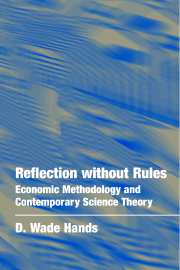Book contents
- Frontmatter
- Contents
- Preface
- 1 Introduction
- 2 The Methodological Tradition in Economics
- 3 The Breakdown of the Received View within the Philosophy of Science
- 4 The Naturalistic Turn
- 5 The Sociological Turn
- 6 Pragmatism, Discourse, and Situatedness
- 7 Recent Developments in Economic Methodology
- 8 The Economic Turn
- 9 Conclusion
- References
- Web Sites
- Index
7 - Recent Developments in Economic Methodology
Published online by Cambridge University Press: 08 January 2010
- Frontmatter
- Contents
- Preface
- 1 Introduction
- 2 The Methodological Tradition in Economics
- 3 The Breakdown of the Received View within the Philosophy of Science
- 4 The Naturalistic Turn
- 5 The Sociological Turn
- 6 Pragmatism, Discourse, and Situatedness
- 7 Recent Developments in Economic Methodology
- 8 The Economic Turn
- 9 Conclusion
- References
- Web Sites
- Index
Summary
This leads to the writing of books of varying character and size, which one suspects are more interesting … to their authors than they are to any considerable number of readers. … this may be a comforting thought, since it means that books on methodology probably do not do much damage. The chief reservation would be that they are most likely to be read and taken seriously by the young.
[Knight 1940, p. 151]Modern economists frequently preach falsificationism … but they rarely practice it: their working philosophy of science is aptly described as “innocuous falsificationism.”
[Blaug 1992, p, 111]If one accepts the terminology of logical positivism and especially of Popper, a theory or hypothesis is “unscientific” if in principle it cannot be refuted by experience. Consequently, all apriori theories, including mathematics and praxeology, are “unscientific.” This is merely a verbal quibble. No serious man wastes his time in discussing such a terminological question. Praxeology and economics will retain their paramount significance for human life and action however people may classify and describe them.
[Mises 1978, p. 70][I]f French chefs resembled neoclassical economists, French cuisine would be more monotonous, for the chefs would use very few ingredients. They would also strenuously insist that food containing any other ingredients was not French.
[Hausman 1992, p. 260]The previous four chapters have examined a large portion of contemporary science theory, and, whereas I made a systematic effort to connect this work to various topics within economics, the main theme was in fact science theory rather than economics or economic methodology.
- Type
- Chapter
- Information
- Reflection without RulesEconomic Methodology and Contemporary Science Theory, pp. 274 - 352Publisher: Cambridge University PressPrint publication year: 2001



